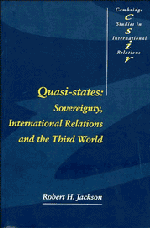Book contents
- Frontmatter
- Contents
- Acknowledgements
- INTRODUCTION
- 1 STATES AND QUASI-STATES
- 2 A NEW SOVEREIGNTY REGIME
- 3 SOVEREIGNTY REGIMES IN HISTORY
- 4 INDEPENDENCE BY RIGHT
- 5 SOVEREIGNTY AND DEVELOPMENT
- 6 SOVEREIGN RIGHTS VERSUS HUMAN RIGHTS
- 7 QUASI-STATES AND INTERNATIONAL THEORY
- CONCLUSION
- Notes
- Index
- CAMBRIDGE STUDIES IN INTERNATIONAL RELATIONS
5 - SOVEREIGNTY AND DEVELOPMENT
Published online by Cambridge University Press: 01 June 2011
- Frontmatter
- Contents
- Acknowledgements
- INTRODUCTION
- 1 STATES AND QUASI-STATES
- 2 A NEW SOVEREIGNTY REGIME
- 3 SOVEREIGNTY REGIMES IN HISTORY
- 4 INDEPENDENCE BY RIGHT
- 5 SOVEREIGNTY AND DEVELOPMENT
- 6 SOVEREIGN RIGHTS VERSUS HUMAN RIGHTS
- 7 QUASI-STATES AND INTERNATIONAL THEORY
- CONCLUSION
- Notes
- Index
- CAMBRIDGE STUDIES IN INTERNATIONAL RELATIONS
Summary
THE DESTITUTE IMAGE OF THE THIRD WORLD
The way we think about international relations today is strongly influenced by a picture of the world as sharply divided between a rich and technologically advanced North, and a poor and backward South. The North–South cleavage rivals and increasingly surpasses the East–West conflict as a dominant perception of the contemporary international system.
They are categorically different, however. The latter could be greatly mitigated by agreements between the United States and the Soviet Union to reduce their arms and increase their dialogue and intercourse. Although it is not yet a certainty, the end of the East–West conflict within the foreseeable future is entirely conceivable. If it happens one statesman, Mikhail Gorbachev, can take a large share of the credit. No such statement can be made about underdevelopment which is not a problem of the same kind. It is not a dispute which can be resolved by diplomacy and international agreements. Instead, it is likely to persist indefinitely since it is a condition deeply rooted in economic, social, cultural, and even psychological facts which are exceedingly difficult to alter even with the greatest good will. It is not a question of honouring one's commitments. Even if firm agreements were made between rich and poor states aimed at ameliorating underdevelopment by increased transfers of finance and technology, they presuppose performances on the part of Third World governments which could not be guaranteed.
- Type
- Chapter
- Information
- Quasi-StatesSovereignty, International Relations and the Third World, pp. 109 - 138Publisher: Cambridge University PressPrint publication year: 1991



